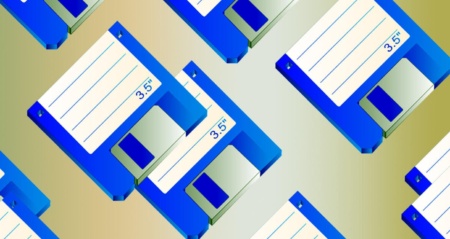
This interview was first published in the book Floppy Disk Fever The Curious Afterlives of Flexible Medium. And we took it from the website eyeondesign.aiga.org and translated it.
Tom Persky, known as the founder of the American company floppydisk.com, which sells and recycles floppy disks, says he is the last person still selling them. The company also recycles and sells broken or used diskettes. This allows it to remain a key player in a small but still profitable niche.
We caught up with Tom while we were working on the book manuscript to talk about the floppy disk industry, the ins and outs of doing business, and what’s changed and what’s stayed the same.
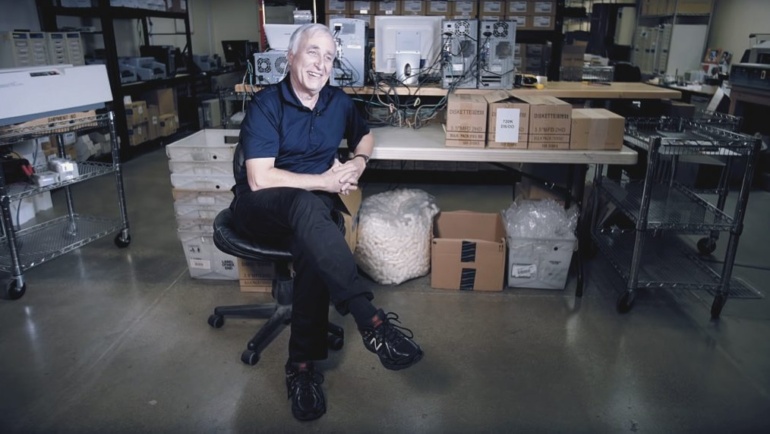
Hi Tom! We would like to know more about your company. Let’s start with the question, how did you get the domain for floppydisks.com?
This happened when the Internet was not yet available to everyone, somewhere in 1990. Once I was contacted and asked if I would like to buy a domain for 1000 dollars. I was outraged and told my wife that I wanted nothing to do with this cybercriminal. But she paid, and so the company got a domain name. It was against my principles at the time, but luckily my wife is much smarter than me.
Were you already selling diskettes then?
Back then, I was doing diskette copying and didn’t even think that one day I would sell blank diskettes. It was a very profitable business in the 1980s and early 1990s. Only later did I start selling blank diskettes: big companies were reducing their production and people were looking for an alternative. At that time, 90% of my business was related to copying CDs and DVDs. Nowadays, everything is the opposite: 90% is the sale of blank diskettes.
How did your business come about?
I worked in Washington as a tax lawyer. At some point, he began to cooperate with a company from California that was engaged in software and performed tax calculations. I gave up my internship at Price Waterhouse and moved to California, where I joined a small firm called Time Value Software.
It was in the early 90s. I had absolutely no experience working with software, but I knew about tax. And I planned to develop the best software with the programmers.
I worked there for about ten years. We have released several such products. In the 90s, software was distributed using 5.25 or 3.5-inch floppy disks.
Once we made a deal with a company that required us to copy hundreds of thousands of floppy disks. We brought in contractors, but it was expensive, time-consuming, and the quality wasn’t that good. Therefore, we decided to buy our own equipment for such cases. In addition, we could copy our software for customers ourselves.
How did a software company get into copying?
Due to the specifics of our company’s work, we only used the copying equipment once a quarter. For 89 days in a row, the machines were idle, and then a day later thousands of diskettes passed through them. At some point, I had an idea for additional income: I started using these machines to fulfill other people’s orders. First an hour a day, then two, then all four, and eventually hired employees.
I’ve actually worked for two companies, one in software, the other in software copying. It ended up being what floppydisks.com created. We currently have three employees and continue to duplicate CDs and DVDs, but most of our revenue comes from the sale of blank floppy disks.
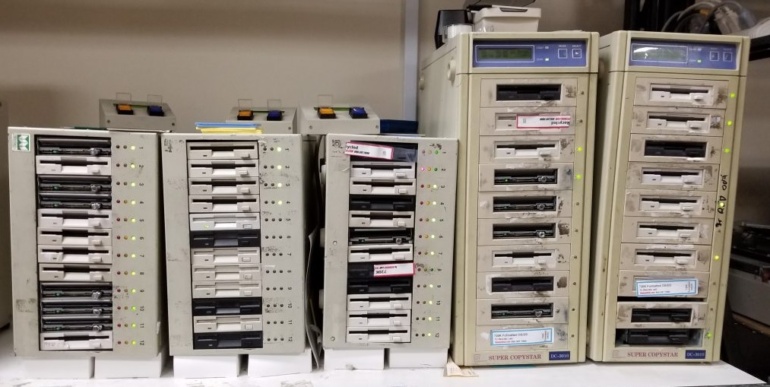
Why so much attention to floppy disks? Why not work with other media?
At first I thought we would only work with floppy disks, not CDs. Then, when we got into them too, I said I would never contact DVD. And now a few years have passed, and here I am dubbing DVDs. I just follow what the customers want.
When people ask me: “Why floppy disks?”, I have a simple answer. Everyone has decided that this niche is dying. But since I already had the equipment, I decided to stay here. The number of diskette users decreased over time, but the number of manufacturers decreased faster. And thus this niche became promising.
How many diskettes do you currently have in stock?
Not as much as I would like, about half a million. We have different options: 3.5 inch, 5.25 inch, 8 inch and some quite rare ones. We also started recycling diskettes: people send old diskettes to us instead of throwing them in a landfill. It really amazes me how many we get: sometimes 1000 discs a day.
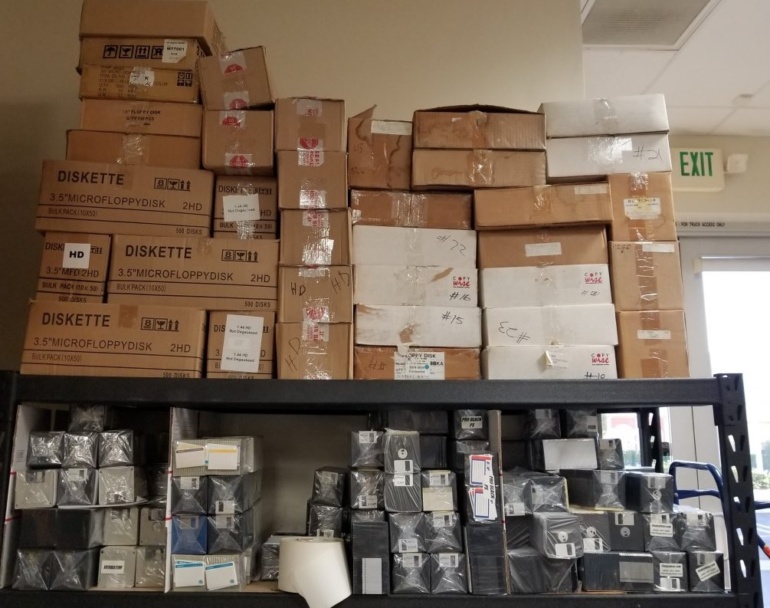
What type of floppy disk is in the most demand? And what are the most valuable?
The most popular is the standard blank 3.5-inch 1.44 MB floppy disk. I would say that the most valuable ones now are the 720kb double density floppies. Of course, there are special 8-inch ones, for which there is very little demand and we have few of them. They are absolutely irreplaceable. The same can be said about the 5.25-inch with four times the density.
You mentioned that the number of companies that still supplied floppy disks had decreased significantly. Is there anyone else left in this market?
The last time I bought about two million floppy disks from a manufacturer was about 12 or 10 years ago. Currently, we practically live on this stock. Sometimes I get very lucky: a couple of years ago a guy called and said, “My grandfather has a bunch of junk in his garage, would you like to buy it?” Of course I was interested. We bargained for a long time, but finally everyone got what they wanted: he – an empty garage and money, and I – about 50,000 diskettes. Sometimes a company cleans out a warehouse and suddenly comes across old floppy disks. They find my site and sell them to me. This is still happening, so I hope to stay in this business for at least four years.
It seems that the number of diskettes is limited after all. Is this a problem?
I once received a request from the Netherlands for half a million diskettes, which I had to decline because I could not supply that amount. Besides, there is another problem. I have many clients who have been with me for more than a year. Thanks to them, I developed my business, paid my mortgage, and paid my employees.
And I want to continue to help them, so selling off the entire supply of diskettes is not a very good idea. But I don’t know how much my stock is worth now. 10 years ago I used to buy floppy disks for 8-12 cents a piece, but in recent years they have gone for $1 a piece, and 720KB double density drives as low as $2. And it’s hard to guess what will happen next.
Who are your main customers?
People from industry are most interested in my business. They bring the most money. Imagine that the year is 1990 and you are building some kind of large industrial plant. You expect it to last 50 years, and you want to use the best technology available. Back then it was a 3.5 inch floppy disk.
Take, for example, the aviation industry. I think half the aircraft fleet in the world today is more than 20 years old and still needs floppy disks for avionics. There is also medical equipment that requires floppy disks. But the largest customer of all is probably the embroidery business: these are thousands of machines that require diskettes. And there are industrial companies that use Sony Mavica cameras for filming. The vast majority of the product I sell is for industrial use. But there are also customers who buy diskettes for their hobby.
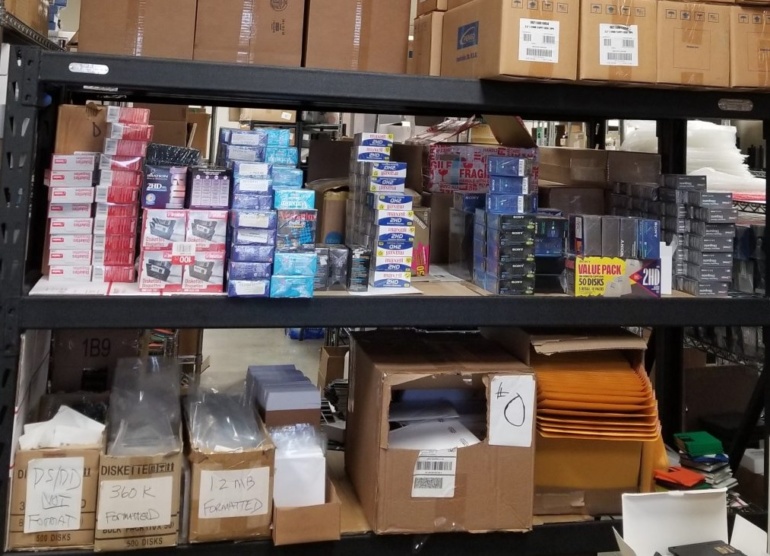
I wonder if there is a demand for diskettes, why were they discontinued?
People tend to think that the production of floppy disks is similar to the production of CDs and DVDs. To generalize, to produce a CD or DVD, you just need to pour plastic into a large machine and get the finished disc. But making a floppy disk is much more difficult and requires more effort. It used to make sense to do this when demand was higher, but now it has decreased.
Also, eventually all industrial machines, all airplanes that still use floppy disks will be replaced. Do you think anyone would want to spend $25 million on factory equipment to see if they could make floppy disks that no one had made for 25 years?
You talk about floppy disks with love. Wondering what they mean to you?
Floppy disk is a very sophisticated, technical, stable, well protected from hackers way to get small amounts of data. I grew up in the Sneakernet days and we worked with information on floppy disks. They have beauty, elegance.
I’m not a watch collector, but I have friends who are. A well-made watch is a pleasure to look at, even though it may be less reliable than a $19 watch. It’s like a work of art. Just think of the human effort it took to create them. The same can be said about a floppy disk.
Do you use floppy disks outside the office?
I have to admit that no. But sometimes I take them home. People send us CDs they find in their boxes. They can no longer open them, but want to access their old address book, PhD thesis or photos that are there.
If we are short on time, I sometimes transfer information from these floppy disks at home while watching football. Sometimes we receive very nice letters: they thank us, say that they received a photo of their late grandmother or children. It’s important to people, that’s why we do it.
Have you ever worried about losing data during the transfer process?
We are doing everything we can. We encourage people to store their data in different ways. Floppy disks are not intended for long-term storage, as are CDs, DVDs, or USB drives. If you have important data, it should not be stored in one place.
It seems that a new wave of interest in retro media is beginning. I am wondering if you are seeing signs of it?
People usually buy CDs for artistic projects, not for software distribution. Sometimes I get approached by game companies who want to republish an old game. By the way, floppies are often used as badges at conferences: then we can sell these people those floppies that cannot be reformatted. And this is about 30%: some of them, perhaps, could be tried to format, but we have doubts about their quality.
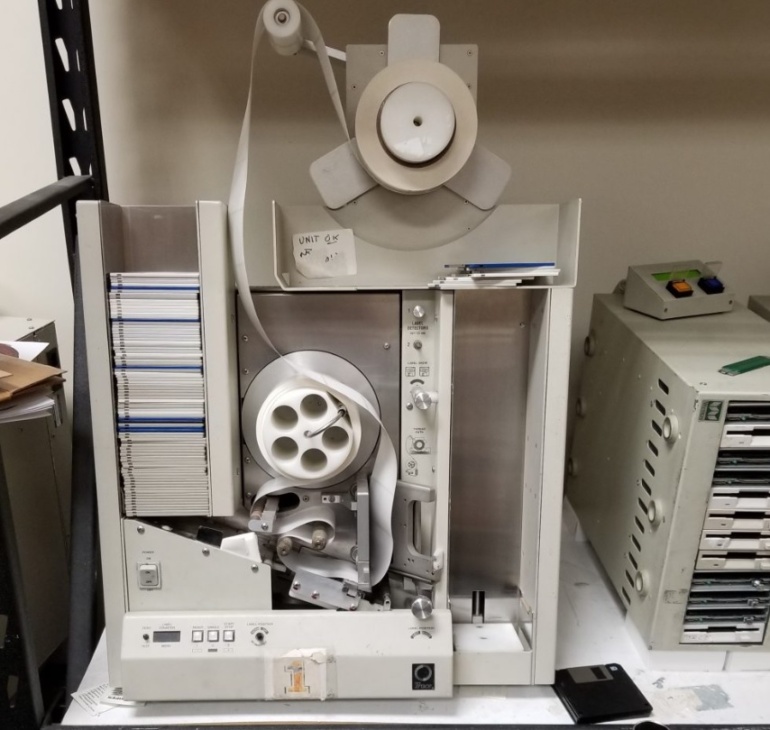
30% sounds like a pretty high rejection rate. Can you tell us something about the quality of the different floppy disks?
Initially, the production process of floppy disks was perfect. It improved significantly later when they began to be produced by the billions. And at the end of the era, the quality deteriorated again. I would say the best floppies were made between 1985 and 2000.
If they were stored under normal conditions, they are as good as before. And half of the diskettes from the last batches that I bought in China turned out to be non-working. The problem with the equipment: if it is not a popular item, you will not spend money on repairs, it is easier to accept 30% of the marriage.
How do you check if the diskettes you sell are usable?
When we receive the diskettes, we make a copy and compare with the original before sending to the customer. If it works for us, it should work for other people. By the way, even in the best of times, a half-percent rejection rate was not unheard of. If you bought 50 in the mid-90s, chances are one or two of them didn’t work.
Have you ever been tempted to sell something other than floppy disks?
No. I am 72 years old and have worked as a tax attorney, software developer and CD/DVD duplicator. Who likes sudoku, who likes crosswords. I just love getting up in the morning, listening to questions and trying to solve problems. And my business is an adventure that I like.
Do you think floppy disks have a future?
I think so, but they won’t be reborn like vinyl. People like record players and they will be perceived as a very niche and cool thing for a long time. And diskettes are more like typewriters. This is a collector’s item. Imagine how difficult it would be to make a new typewriter today. Although some American writers say they can only work on a typewriter.
I think there will be something similar with diskettes. You cannot replace them. You know that joke where a three-year-old girl comes to her father with a floppy disk in her hand and says: “Dad, dad, someone made a 3D model of the save command”?




